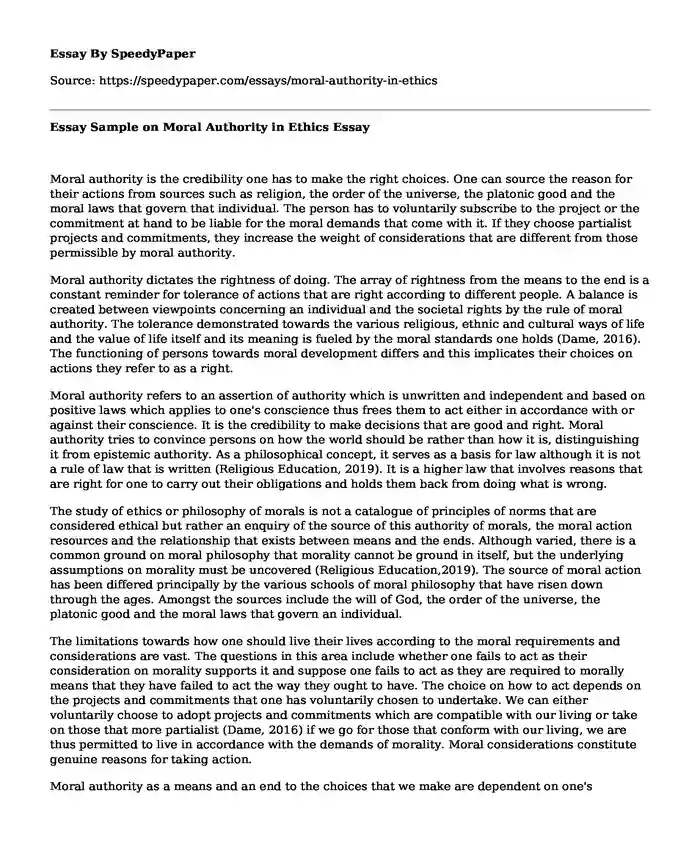Moral authority is the credibility one has to make the right choices. One can source the reason for their actions from sources such as religion, the order of the universe, the platonic good and the moral laws that govern that individual. The person has to voluntarily subscribe to the project or the commitment at hand to be liable for the moral demands that come with it. If they choose partialist projects and commitments, they increase the weight of considerations that are different from those permissible by moral authority.
Moral authority dictates the rightness of doing. The array of rightness from the means to the end is a constant reminder for tolerance of actions that are right according to different people. A balance is created between viewpoints concerning an individual and the societal rights by the rule of moral authority. The tolerance demonstrated towards the various religious, ethnic and cultural ways of life and the value of life itself and its meaning is fueled by the moral standards one holds (Dame, 2016). The functioning of persons towards moral development differs and this implicates their choices on actions they refer to as a right.
Moral authority refers to an assertion of authority which is unwritten and independent and based on positive laws which applies to one's conscience thus frees them to act either in accordance with or against their conscience. It is the credibility to make decisions that are good and right. Moral authority tries to convince persons on how the world should be rather than how it is, distinguishing it from epistemic authority. As a philosophical concept, it serves as a basis for law although it is not a rule of law that is written (Religious Education, 2019). It is a higher law that involves reasons that are right for one to carry out their obligations and holds them back from doing what is wrong.
The study of ethics or philosophy of morals is not a catalogue of principles of norms that are considered ethical but rather an enquiry of the source of this authority of morals, the moral action resources and the relationship that exists between means and the ends. Although varied, there is a common ground on moral philosophy that morality cannot be ground in itself, but the underlying assumptions on morality must be uncovered (Religious Education,2019). The source of moral action has been differed principally by the various schools of moral philosophy that have risen down through the ages. Amongst the sources include the will of God, the order of the universe, the platonic good and the moral laws that govern an individual.
The limitations towards how one should live their lives according to the moral requirements and considerations are vast. The questions in this area include whether one fails to act as their consideration on morality supports it and suppose one fails to act as they are required to morally means that they have failed to act the way they ought to have. The choice on how to act depends on the projects and commitments that one has voluntarily chosen to undertake. We can either voluntarily choose to adopt projects and commitments which are compatible with our living or take on those that more partialist (Dame, 2016) if we go for those that conform with our living, we are thus permitted to live in accordance with the demands of morality. Moral considerations constitute genuine reasons for taking action.
Moral authority as a means and an end to the choices that we make are dependent on one's conscience is based on unwritten principles of doing what is right. The choice on what is morally right depends on what source one has the authority grounded on such as God's will, the platonic good and the moral laws that govern the individual. The person's subscription to the commitment at hand will be guided on their voluntary indulgement into the given purpose and the considerations they take upon acting on it.
References
Dame, E. (2016). The Limits of Moral Authority // Notre Dame Philosophical Reviews // University of Notre Dame. Notre Dame Philosophical Reviews. Retrieved 19 February 2019, from
https://ndpr.nd.edu/news/the-limits-of-moral-authority/II THE SOURCE OF MORAL AUTHORITY. (2019). Religious Education. Retrieved from https://www.tandfonline.com/doi/abs/10.1080/0034408620570604?journalCode=urea20
Cite this page
Essay Sample on Moral Authority in Ethics. (2022, Nov 29). Retrieved from https://speedypaper.net/essays/moral-authority-in-ethics
Request Removal
If you are the original author of this essay and no longer wish to have it published on the SpeedyPaper website, please click below to request its removal:
- Astronomy Essay Example: Geocentrism
- Free Essay on How the Draft of WW2 Impacted Professional Sports in the US
- Education Essay Example: Individualized Education Plan for Dillion
- Mirror Lake Inn Restaurant, Essay Sample for Students
- Free Essay: Arguments For and Against Insisting That Some Construction Costs Be Expensed
- Introduction to Counseling, Essay Sample for Your Inspiration
- Intercultural Communication - Free Essay Sample for Your Inspiration
Popular categories





